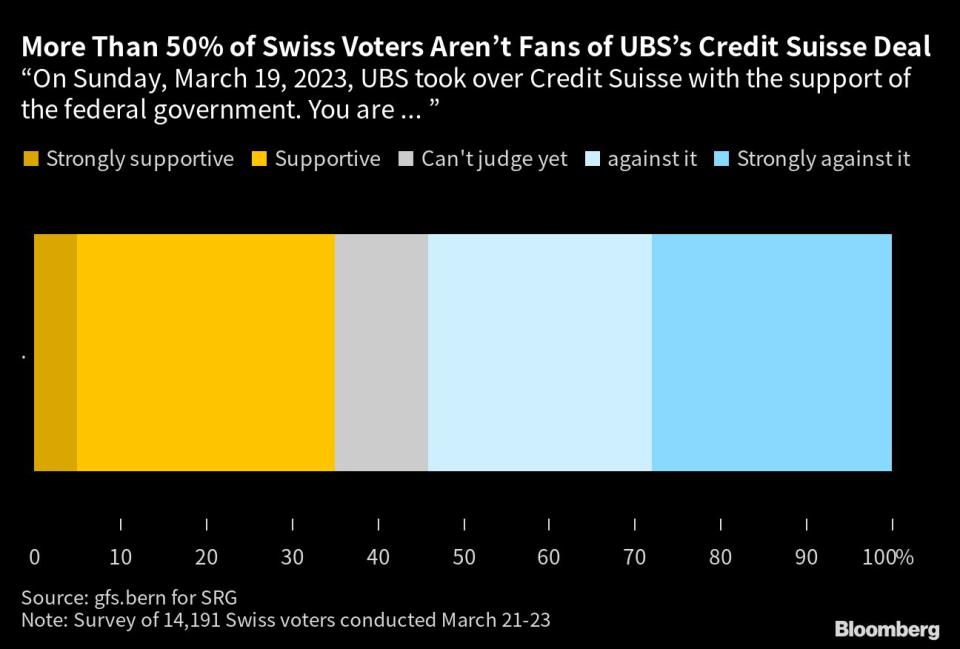Swiss Lower House Censures UBS Guarantees in Symbolic Vote
(Bloomberg) -- Switzerland’s lower house made a symbolic vote against providing state guarantees for UBS Group AG’s takeover of Credit Suisse Group AG, reflecting a high degree of public discontent with the deal.
Most Read from Bloomberg
JPMorgan Calls Managing Directors to Office Five Days a Week
US Core Inflation Slows Only a Bit, Keeping Fed on Track to Hike
Fed Leans Toward Another Hike, Defying Staff’s Recession Outlook
The lower house rejected a compromise offered by the upper house, leading to a failure of the bill and ending parliamentary proceedings. Irrespective of the vote, parliament can’t stop the takeover negotiated last month as a designated committee of lawmakers had already signed off on it.
The rejection nonetheless casts a shadow over the already-fraught process of integrating two global banks, particularly as significant job cuts loom in Switzerland in a year when national elections are due. In the aftermath of the historic $3.3 billion deal, lawmakers have called for various changes including greater powers for the financial regulator Finma, though little consensus has emerged.
“The majority in parliament wanted to make a statement,” said Michael Hermann, a political scientist and head of Zurich-based research institute Sotomo. “This shows that the topic politically causes high waves in Switzerland.”
Read More: UBS Says Credit Suisse Integration Bigger Than 2008 Deals
A coalition of the populist right and the left generated enough votes to ensure the bill didn’t pass. It would have given the stamp of approval for putting state funds of as much $120 billion at stake. The Swiss People’s Party SVP, which forms the largest bloc, lobbied together with the Greens and some Social Democrats against it.
“The SVP has been insisting since 2008 that we have no bank that cannot go bankrupt,” said Pirmin Schwander, a member of the lower house for the party. The state guarantees only fuel a “narcissistic company culture” among bankers, he said.
UBS Effect
The vote, with 103 ballots against, 71 in favor and eight abstentions, is a defeat for Finance Minister Karin Keller-Sutter and the delegation of senior lawmakers which agreed to the backstop on behalf of parliament before the takeover was announced in March.
The debate is unlikely to have any immediate effect on UBS, but may indicate appetite for stricter rules on the horizon. UBS has already faced questions over the combined company’s heft — double the size of the Swiss economy — and its potential local dominance. UBS’s vice chairman said last week that the bank will consider all options for Credit Suisse’s Swiss unit.
The Swiss government earlier this month said that UBS must ensure its pay structures encourage employees to avoid using the state guarantee.
Politicians and business leaders had voiced worries that the combined lender will have excessive market power, leading to a loss of competition. Despite the risks involved in integrating Credit Suisse, UBS stands to become a banking “powerhouse” post merger, analysts at JPMorgan Chase & Co. wrote in a note Tuesday.
The deal was also met with little public enthusiasm.
During the afternoon it looked like the parliament in Bern could reach an agreement, with some Social Democrats changing their views. A stricter stance on banks — a compromise had lined out higher equity requirements and restricted bonuses — is “a major development,” Social Democrat lawmaker Roger Nordmann had said.
“The debate is ticked off now. There will be no further cleanup of the differences between parliament and government,” Sotomo’s Hermann said. “Now everyone can feel vindicated again that democracy has been eroded. This discontent with the system will further strengthen populists and the far right.”
Swiss Politics
Switzerland’s executive isn’t made up of a coalition or an outright majority, but of seven ministers from the country’s four largest parties. They usually make decisions by consensus and try to find pragmatic compromises — often outside of party lines.
Ministers don’t publicly oppose government decisions, irrespective of their parties’ stance on a matter or how they personally voted behind closed doors.
This setup means that parliament offers parties the most prominent platform to sway voters, which explains aggressive comments in that forum even if they at times lack bite.
(Updates throughout with vote)
Most Read from Bloomberg Businessweek
©2023 Bloomberg L.P.

 Yahoo News
Yahoo News 


